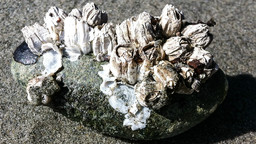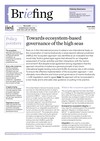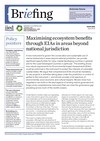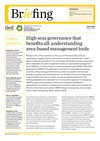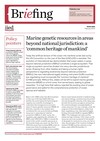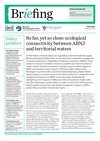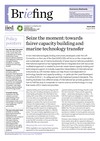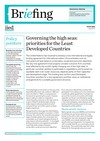Helping the LDCs negotiate the high seas
IIED is helping the least developed countries (LDCs) to participate effectively in talks about a new international treaty on the high seas.

In 2008 the captain of this deep-sea fishing trawler was convicted of illegal fishing and providing misleading information about catches (Photo: Bernard Spragg.NZ, Creative Commons via Flickr)
More than 50% of the earth's surface is not governed by any international treaty. The high seas are arguably one of the last unprotected areas on the planet. They include some of the most biologically important and most fragile ecosystems in the world.
The threats to these regions, also known as marine Areas Beyond National Jurisdiction, are being driven by technological advances such as deep-sea fishing, seabed mining and the exploitation of marine genetic resources by pharmaceutical companies.
In 2015 the UN General Assembly adopted a resolution (PDF) stressing "the need for the comprehensive global regime to better address the conservation and sustainable use of marine biological diversity of areas beyond national jurisdiction."
Member states unanimously agreed to launch a series of preparatory negotiations to develop an international treaty to govern these areas. These meetings convened in 2016, 2017 and 2018. The meetings looked at four different topics:
- Marine genetic resources, including issues of access and benefit sharing
- Area-based management tools, including marine protected areas
- Environmental impact assessments, and
- Capacity building and transfer of marine technology.
What IIED is doing
IIED is working with the LDCs to increase their engagement and effectiveness in the talks. The preliminary negotiations and the ensuing treaty are of vital importance to the LDCs: the high seas are used by migratory fish as breeding grounds, and the exploitation or destruction of these ecosystems could have a major impact. The technology that enables the exploitation of the high seas is the preserve of advanced nations: vessels from ten rich nations, including Japan, Korea, and Spain, take 71% of fishing catches from the high seas.
IIED is providing legal, technical and strategic advice to equip LDC negotiators with the information they need to take forward positions and support strong marine conservation measures.
An animation exploring how a new global treaty – the first of its kind – could end lawlessness that threatens conservation of the high seas
We are analysing and helping to draft position papers informing the LDC’s strategy, and working to ensure active participation by LDC delegates in the preparatory discussions, including preparing submissions or interventions by these countries in support of the need to include strong conservation measures.
As part of this work we convened two workshops for negotiators from the LDCs at which participants were able to develop and draft position papers and statements in support of high seas conservation and sustainable use.
We are producing policy briefings for LDC negotiators on topics such as the importance of high seas marine protected areas, environmental impact assessments, capacity building and technology transfer, as well as benefit sharing.
IIED has convened a panel of experts to design, in collaboration with Pew Research, a scenario analysis to evaluate high seas marine protected area governance options. This will analyse the cost effectiveness and ecological, social and economic implications of different management regimes for high seas conservation.
IIED's Essam Yassin Mohammed explains why we need fair and inclusive governance of the high seas
In September 2018 the first session of the Intergovernmental Conference on BBNJ was held in New York, where IIED supported LDC negotiators to have their priorities considered in negotiations.
While in New York, IIED's Essam Yassin Mohammed was interviewed by Radio France Internationale:
If your browser doesn't support HTML5 audio, here is a link to the audio instead.
News and updates
Publications
Additional resources
Longread: Action for an ocean for all, by Maggie Watson (March 2019)
Blog: Focusing the blue economy future on small-scale fisheries, by Rosalind Goodrich (February 2019)
Animation: Governing the high seas: half of the planet that belongs to us all (February 2019)
Poster: Governing the high seas: half the planet that belongs to us all
Blog: Green lessons for the blue economy, by Laura Kelly (December 2018)
Towards an inclusive blue economy, Essam Yassin Mohammed (2018), Project flyer
Fish Night 4: Governing our high seas. Why now?, meeting report 2016

